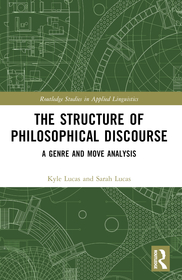
The Structure of Philosophical Discourse
A Genre and Move Analysis
Sorozatcím: Routledge Studies in Applied Linguistics;
-
20% KEDVEZMÉNY?
- A kedvezmény csak az 'Értesítés a kedvenc témákról' hírlevelünk címzettjeinek rendeléseire érvényes.
- Kiadói listaár GBP 42.99
-
20 538 Ft (19 560 Ft + 5% áfa)
Az ár azért becsült, mert a rendelés pillanatában nem lehet pontosan tudni, hogy a beérkezéskor milyen lesz a forint árfolyama az adott termék eredeti devizájához képest. Ha a forint romlana, kissé többet, ha javulna, kissé kevesebbet kell majd fizetnie.
- Kedvezmény(ek) 20% (cc. 4 108 Ft off)
- Kedvezményes ár 16 430 Ft (15 648 Ft + 5% áfa)
Iratkozzon fel most és részesüljön kedvezőbb árainkból!
Feliratkozom
20 538 Ft

Beszerezhetőség
Becsült beszerzési idő: A Prosperónál jelenleg nincsen raktáron, de a kiadónál igen. Beszerzés kb. 3-5 hét..
A Prosperónál jelenleg nincsen raktáron.
Why don't you give exact delivery time?
A beszerzés időigényét az eddigi tapasztalatokra alapozva adjuk meg. Azért becsült, mert a terméket külföldről hozzuk be, így a kiadó kiszolgálásának pillanatnyi gyorsaságától is függ. A megadottnál gyorsabb és lassabb szállítás is elképzelhető, de mindent megteszünk, hogy Ön a lehető leghamarabb jusson hozzá a termékhez.
A termék adatai:
- Kiadás sorszáma 1
- Kiadó Routledge
- Megjelenés dátuma 2025. július 30.
- ISBN 9781032544557
- Kötéstípus Puhakötés
- Terjedelem290 oldal
- Méret 229x152 mm
- Súly 540 g
- Nyelv angol
- Illusztrációk 14 Illustrations, black & white; 1 Halftones, black & white; 13 Line drawings, black & white; 46 Tables, black & white 683
Kategóriák
Rövid leírás:
This book builds on existing work in genre analysis and move analysis in English for Specific Purposes and applies this new framework to academic philosophical discourse, offering new insights into how ESP traditions can elucidate shifts in language conventions across disciplinary contexts.
TöbbHosszú leírás:
This book builds on existing work in genre analysis and move analysis in English for Specific Purposes (ESP) and applies this new framework to academic philosophical discourse, offering new insights into how ESP traditions can elucidate shifts in language conventions across disciplinary contexts.
The volume begins by surveying the state of the art in English for Specific Purposes and genre theory, as well as other genre theory paradigms before turning the focus on move analysis. Lucas and Lucas seek to maximize the potential of move analysis to precisely operationalize functional units of discourse by implementing a cognitive theory of genre grounded in frame semantics. Using the case of academic research articles in philosophy, the authors demonstrate how this framework can reveal distinctive dimensions unique to philosophical discourse and, in turn, how such an approach might be applied more broadly to examine nuances in language across disciplines and inform ESP research in the future.
This book will appeal to students and researchers in English for Specific Purposes, discourse analysis, academic writing, applied linguistics, and rhetoric and composition.
"Philosophers do not have very developed vocabularies for talking about the structure of philosophical writing, which does philosophy students at both the graduate and undergraduate levels a disservice. This work is part of the solution. Philosophers tend to lean on argument forms to describe writing, which rarely capture the global structure of a philosophy paper. By clearly distinguishing between the macro- and micro-structure within philosophical writing, the work goes a long way towards making visible the structure of papers in the central journals of analytic philosophy and will make an excellent resource for students and teachers of philosophy."
Christopher Yeomans, Professor of Philosophy, Purdue University
"In this comprehensive, groundbreaking, lucid, and very readable book, the authors employ both theoretical and empirical means to develop a clear and detailed description of philosophical discourse, working from and adding to the ESP research tradition, and, in the process, contributing new and productive insights into genre and move analysis."
Tony Silva, Professor Emeritus of English, Purdue University
TöbbTartalomjegyzék:
Contents
Acknowledgements
Chapter 1: Introduction
1.1 English for Specific Purposes, genre, and move analysis
1.2 Research space and motivation
1.3 Innovating genre and move analysis
1.4 Outline of remaining chapters
Chapter 2: Genre across research traditions
2.1 ESP genre theory and Swales’ framework
2.2 Situating ESP genre theory: A comparative analysis
2.3 Criticisms and recent changes in the ESP tradition
2.4 The need for further theorizing
Chapter 3: A cognitive theory of genre
3.1 A definition of genre
3.2 Genre frames
3.3 Illocutionary and perlocutionary frame elements
3.4 Prototypicality effects in text classification
3.5 The basic level
3.6 Conclusion
Chapter 4: Introduction to move analysis
4.1 Move analysis overview
4.2 Building a corpus for move analysis
4.3 Analyzing the corpus
4.4 Refining move analysis
4.5 Conclusion
Chapter 5: What move analysis has revealed about academic writing
5.1 What move analysis has revealed about research article sections
5.2 What move analysis has revealed about writing across the disciplines
5.3 New horizons for move analysis and linguistic analysis
5.4 Conclusion
Chapter 6: Writing in philosophy
6.1 Move analysis studies of philosophical writing
6.2 Other forms of research on philosophical writing
6.3 Conclusion
Chapter 7: The corpus of philosophical research articles
7.1 The discipline of philosophy
7.2 Overview of the philosophical research article corpus
7.3 Situational analysis of corpus
7.4 Representativeness of the corpus
7.5 Methodological framework: Move analysis and communicative functions
7.6 Conclusion
Chapter 8: The macro-structure of philosophical discourse
8.1 The purpose and macro-structure of philosophy research articles
8.2 Macro-structures: Sequences and cycles
8.3 Discussion
8.4 Conclusion
Chapter 9: The micro-structure of philosophical discourse
9.1 Moves and steps in the introduction
9.2 Moves and steps in the body of the work
9.3 Argumentative strategies
9.4 Moves and steps in the conclusion
9.5 Conclusion
Chapter 10: Additional aspects of philosophical discourse
10.1 Overview of systemic functions
10.2 Footnotes
10.3 Key systemic functions
10.4 Conclusion
Chapter 11: Conclusion
11.1 Notable findings
11.2 Broader significance
11.3 Limitations and future research
Appendix: Corpus of research articles
Index
Több




